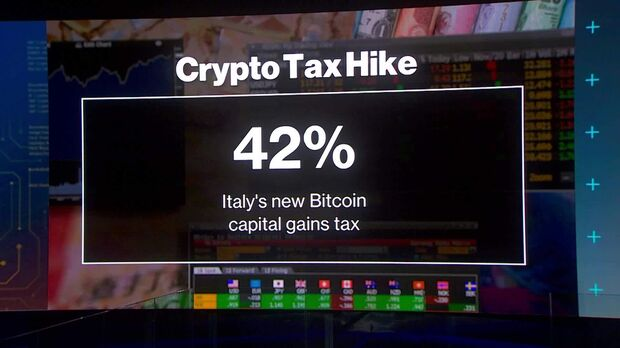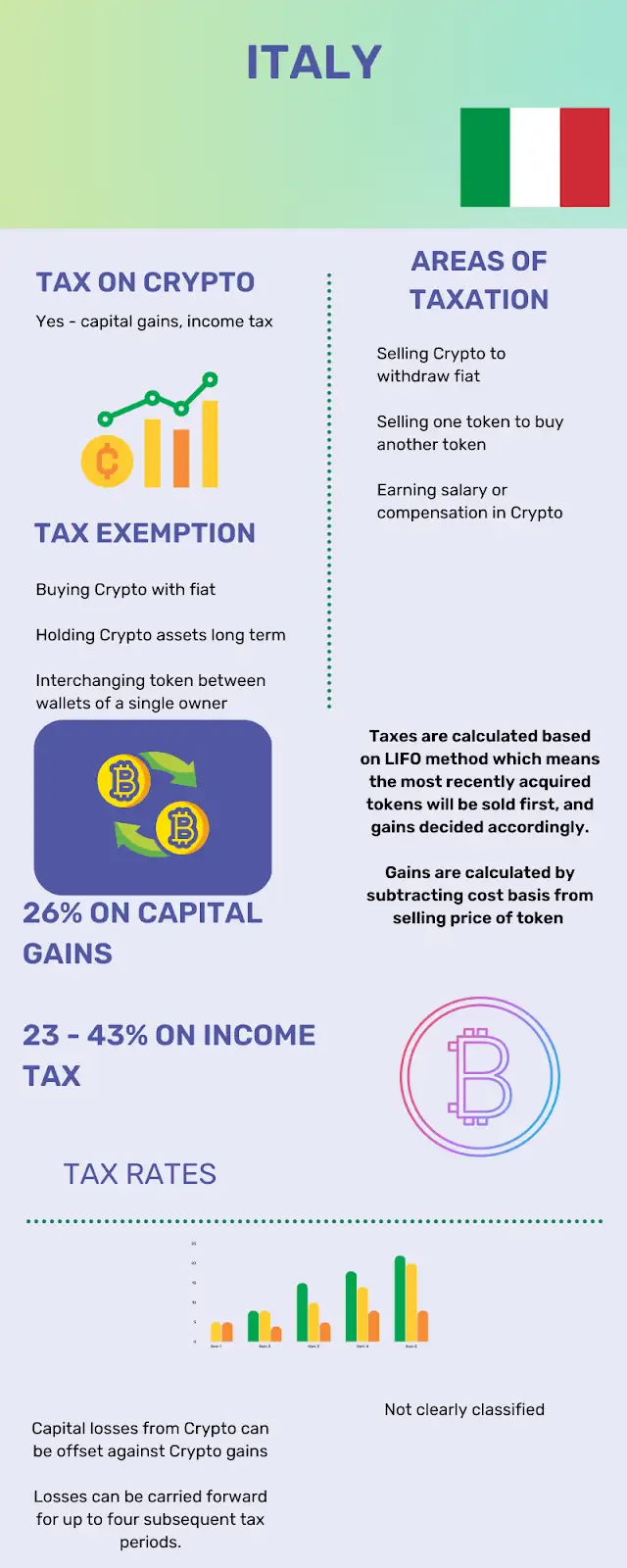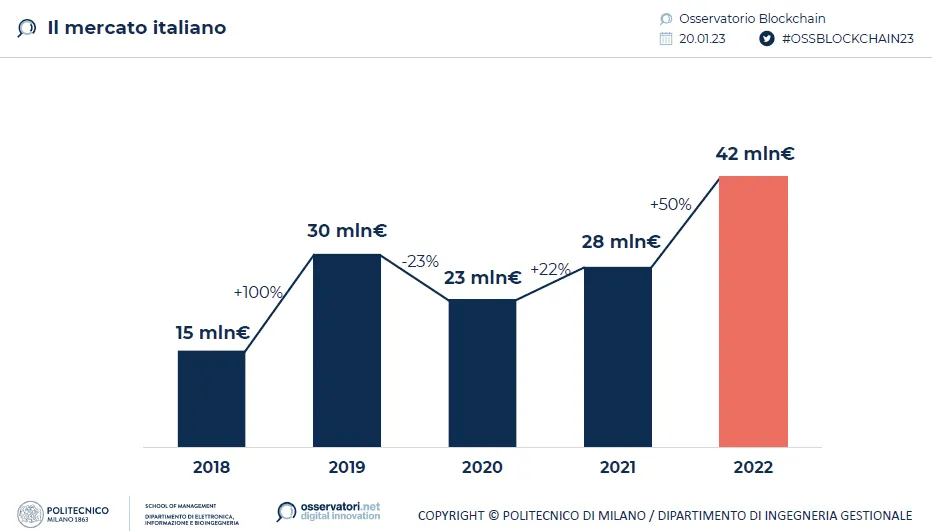The New Framework

Agenzia delle Entrate’s present categorization of crypto is the same as other financial assets & securities for crypto holders. Nonetheless, their framework continues to evolve, developing other policies from foundational tax laws such as Decree 58/2023. Currently, any gains from crypto trading are still classified as "miscellaneous income" (26% tax), which is different from that of fiat currency gains. Thus, your virtual cash increases are seen as an investment rather than just another income.
Classification
Furthermore, Agenzia delle Entrate also classifies you as a business entity if you are involved in systematic trading, such as mining, or as an individual investor. These classifications further determine your obligation, as individuals only pay fees on capital gains, while business entities are treated under a different set of rules.
Updated Legislation
But more importantly, digital cash investors in Italy need to be aware of the current changes in Italy's cryptocurrency laws, one of which is the increase from 26% to 33% for most capital gains. These laws will replace the previous €2,000 exemption threshold with a new form that recognizes this increased rate.
Nevertheless, shrewd crypto investors, especially those expecting continuous future growth in crypto gains, have the option of the 18% substitute tax on portfolio. However, this works by resetting the cost basis with the current market value of holdings at a specific date for future gain calculation.

Navigating all these classifications, thresholds, and changing tax rates can feel overwhelming, especially when every trade or swap might trigger a taxable event. 8lends helps crypto investors and businesses in Italy automate the entire tax reporting process – from gain calculation and LIFO tracking to generating compliant reports for Agenzia delle Entrate. With 8lends’ system handling the complex math and documentation, you can focus on strategy while staying perfectly aligned with Italy’s evolving crypto tax laws.
What Constitutes Taxable Events in Italy
Having a foundational understanding of Italy’s laws begins with understanding which operations must be paid on. Below is a list of activities that trigger tax obligations under Italy’s crypto laws.
- Crypto to fiat: This constitutes the simplest form of taxable activity. Whenever you change any stablecoin, such as Bitcoin or Ethereum, to fiat currencies like euros or dollars, you are charged a percentage on the profit after calculating the cost basis. Italy’s LIFO (Last in First Out) method also applies to this calculation.
- Virtual-virtual trade: Italy charges traders for increases they make by exchanging cryptos. For instance, a trade where Ethereum is exchanged for bitcoin automatically triggers payment on increases made in this exchange.
- Digital cash settlements: It’s not uncommon these days for businesses & services to accept cryptocurrency as payment. Say you obtain a wristwatch for €10,000 with Ethereum that you acquired for €5,000. The €5,000 difference there becomes taxable.
- Mining rewards: In contrast to capital gains from trading, mining constitutes ordinary income, which is calculated progressively for taxation purposes. Potentially, mining reward rates can surpass fiat rates given their progressive calculation. However, the euro value of every reward received must be documented.
- Staking: Just like mining rewards, this is treated as rewards in euros in the fair market. But unlike mining, capital increases undergo subsequent appreciation of the rewards received until it is sold.
- Airdrops and forks: The tokens received in both cases are immediately taxable on receipt, even though they’ve not been disposed of. Under taxation policy, these are seen as ordinary income and are taxable based on the fair market value in euros.
Non-Taxable Activities: What Doesn't Trigger Taxes
Not all activities are taxable, and understanding this helps you optimize and structure your investment strategy and avoid non-compliance.
- Holding cryptocurrency: Watching your coins grow in your wallet over time, say from €2,000 to €200,0000, does not trigger any taxable liability as long as it is not disposed of.
- Moving between wallets: While you need to ensure proper records of transfers between all your personal wallets, moving your coins between wallets that belong to you does not incur any obligation.
- Gifting family members: Although there are specific rules and relationship conditions, gifting family members Bitcoin, Ethereum, or other forms of virtual currency is generally tax-free.
- Trading losses: Italy's laws provide a mechanism that allows for the deduction of losses from gains, effectively reducing an individual's liability. Once you ascertain that you made a loss above €2,000, you qualify for this offering.

Calculation
The multi-component dimension of Italian tax laws makes it important to have a clear understanding of how rates must be computed for assessing obligations. Italy provides a threshold of €2,000 beyond which a rate of 26% is applied to the extras above the €2,000 threshold. Still, some interpret this exemption as a reporting threshold where any increment beyond the threshold makes the whole gain taxable. However, this is only in effect until the end of the 2024 fiscal year.
There is the 18% rate option, which considers the value of holdings as of the 1st of January and which must be chosen by June 30th. This is especially beneficial to traders who have significant unrealized gains. There is another rule for systematic trading, which involves activities like mining or staking. These gains are classified as business income and subject to progressive rates, which can be as high as 43%. It also comes with more requirements, such as social security and VAT registration.
Furthermore, the ingrained LIFO calculation method in Italy’s system is mandatory for reference cost calculation, as it considers the most recent cost for digital coins purchased.
Record-Keeping Requirements: Building Audit-Ready Documentation

A fundamental proactive measure is for every taxpayer in Italy to have excellent record-keeping, as this ensures their ability to prove their compliance in cases of government audits. Here are some of the most important details to keep for different document types.
For any transaction carried out, quantities, dates, timestamps, counterparties, and prices must be logged for each virtual coin. This ensures the accuracy of your calculations, especially when determining wins & losses.
Also, document every trade confirmation, account statements, and withdrawal/deposit records. Don't forget to archive all that for future reference.
Being able to track all transactions on a public blockchain often makes auditing easy, especially for independent verification. Hence, ensuring you keep records of all transaction IDs, hashes, and wallet addresses is very crucial.
It is also advisable to always keep records of euro market values for all transactions, including staking, mining, and airdrop activities. This ensures that your income and obligations are calculated using the right cost basis.
Purchase history is another critical record that needs to be properly organized, given that the LIFO method is used to calculate cost basis. The chronological occurrence of transactions, including dates and costs, augments the accuracy of the LIFO method.
Filing Requirements and Compliance Deadlines
The Modello 730 and Modello Redditi are the primary modes of filing for Italian residents. The two apply to different sets of taxpayers with different deadlines as well. Modello 730 caters to income earners and individuals with deductions to declare. However, they must submit their filings by September 30th. Individuals with foreign assets and capital gains will use the Modello Redditi and submit their filings by October 15th using Form RW for foreign assets and RT for capital gains.
Additionally, for cryptocurrency disposal, Form RT addresses capital gains with sections to detail all transactions leading to gains or losses with the LIFO method specifically mandated for calculating cost basis. Form RW mandates the reporting of cryptocurrency held on foreign exchanges or in foreign wallets. This applies even if there’s no alienation of the asset within the fiscal year. Non-compliance can trigger penalties that go up to 240% of the unpaid tax, including interest.

Conclusion
Italy’s ability to infuse clarity into its system despite its complexity has made it one of Europe’s most comprehensive tax frameworks. Given its structured filing systems, €2,000 threshold, and 26% rate, Italy’s residents have a working tax framework to enable them to remain compliant. Also, due to the ever-evolving cryptocurrency landscape, it is only a matter of time before this system changes. Still, taxpayers with proactive planning and detailed record-keeping will find it easy to comply regardless of a 26% or 33% rate.
Ultimately, understanding the requirements of Italy’s taxation framework is essential if success in financial strategy and compliance is the goal. As Italy’s cryptocurrency tax rules continue to evolve, having the right strategy and tools in place makes all the difference. Platforms like 8lends provide investors and professionals with the clarity, accuracy, and automation needed to stay fully compliant with ease.








